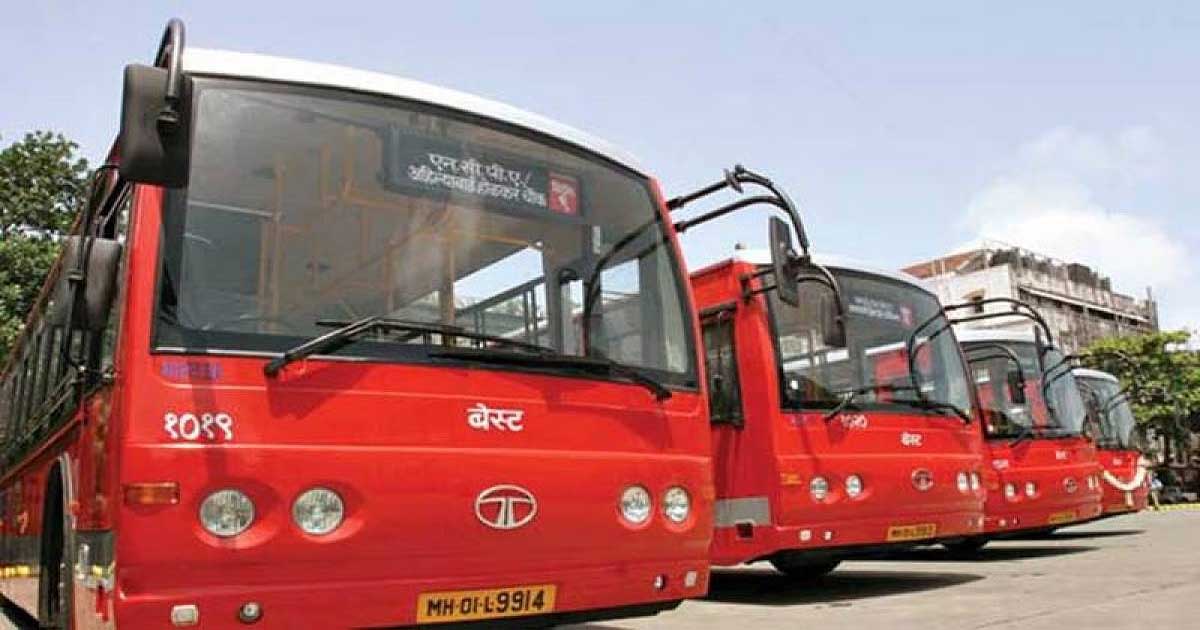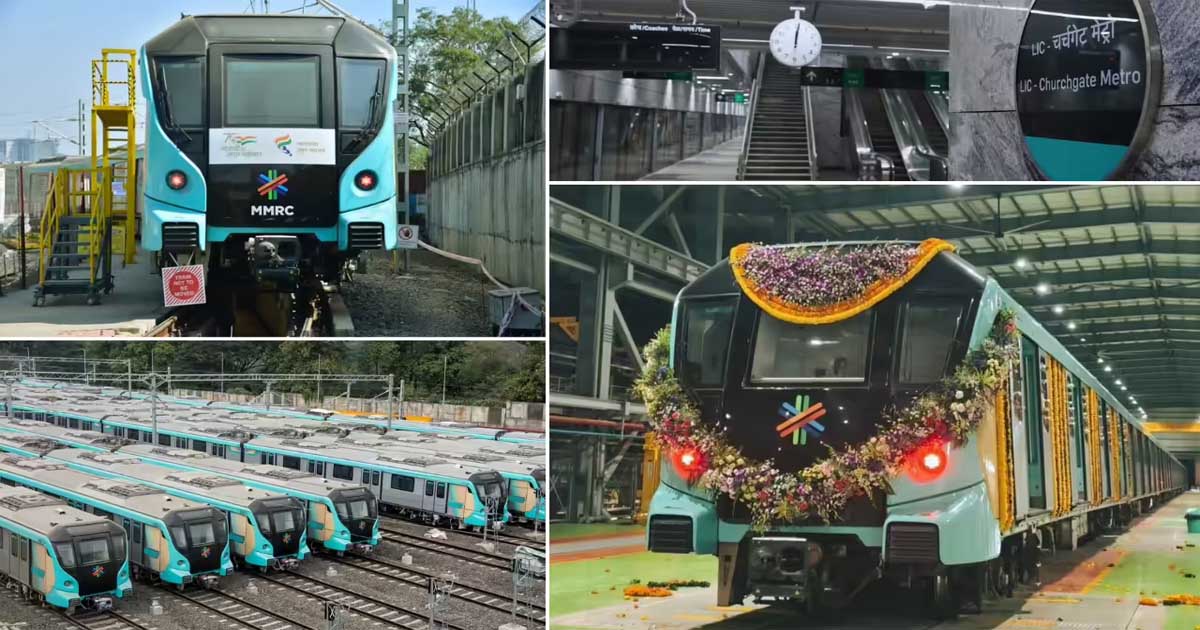Maharashtra
Mumbai Metro 3 Progress Update: 97% Work Of Phase 1 Connecting Seepz To BKC Completed; Operations To Begin Soon

Mumbai: The Mumbai Metro 3 project, an ambitious infrastructure venture, has reached a significant milestone with 97% of the work on its first phase, connecting Seepz to the Bandra-Kurla Complex (BKC), now complete. The update, shared by Metro 3 officials on the project’s official social media handle on X (formerly Twitter), stated that the final stages of testing are underway.
The post further provided details that inspections of all stations within Phase 1 had been carried out by the Fire Brigade department of the Municipal Corporation of Greater Mumbai (MCGM). Electrical systems and other crucial infrastructure components are also in their final testing stages.
Mumbai Metro 3 Shares Update On Progress
The Mumbai Metro 3 post on X stated, “Total 97% work of Phase 1 of Metro 3 is completed. Inspections of all stations under phase 1 have been done by the Fire Brigade department of MCGM. The testing of electrical and all other systems is in the final stage. By next week MMRC will submit an application to invite the Commissioner of Metro Railway Safety (CMRS) who will check various safety aspects of metro systems. Stay tuned!”
Project Planned To Be Flagged Off In July
Initially, the first phase of the Metro 3 project was scheduled to commence operations on July 24. However, due to pending safety checks and certification approvals, the launch of this vital transportation link has been delayed. Contrary to reports suggesting that the Metro 3 operations would begin soon, the Mumbai Metro Rail Corporation Ltd (MMRCL) has not yet finalised the date for Phase 1 of the Aqua Line to become operational.
According to recent updates from the Free Press Journal, MMRCL is still awaiting necessary certifications before beginning operations. Phase 1 of Metro 3, which runs between Aarey Colony and BKC, will commence once all approvals have been secured. Ultimately, the Aqua Line will serve a route stretching from Colaba to SEEPZ, enhancing Mumbai’s public transportation network.
Exact Date Of Inauguration Yet To be Finalised
A senior MMRCL official confirmed that the exact date for the commencement of Metro 3 operations has yet to be determined. The inspection by the Commissioner of Metro Rail Safety (CMRS) remains pending and the launch date will only be set once the CMRS gives the green light. The official hinted that MMRCL might invite the CMRS for inspection within the month.
Further insights from the official revealed that 99% of the civil work has been completed, with metro station construction at 97% and tunneling work fully accomplished. Overall system work is 77.6% complete, civil works at the depot are 99.8% finished, and mainline track work is 87% complete.
About Mumbai Metro 3 Project
Metro 3, spanning a 33.5-kilometer underground corridor along the Colaba-Bandra-SEEPZ route, features 27 stations, of which 26 are underground and one is at grade. The project requires multiple clearances, including from the Research Design and Standards Organisation (RDSO), the Independent Safety Assessor (ISA), and the CMRS. The RDSO has completed its inspection, and the ISA’s inspection is ongoing.
MMRCL currently has a fleet of 19 rakes, which is sufficient to operate Phase 1 of the metro. Once operational, the Aqua Line is expected to offer 260 services daily, accommodating approximately 1.7 million passengers. MMRCL is also focusing on integrating multi-modal connectivity at stations, which includes connections to other public transport modes, improved footpaths, seating arrangements and foot over bridges to enhance last-mile connectivity.
Maharashtra
“Mumbai Deepfake Fake Video Share Trading Fraud Interstate Gang Uncovered ; 4 arrested”

Mumbai: The Cyber Cell of Mumbai Crime Branch has claimed to have busted an inter-state gang that was trying to lure investors into investing in the share market by creating fake and deepfake videos of experts on a renowned business news channel. The complainant is a registered analyst with SEBI. On September 29, 2025, an attempt was made to lure investors into investing in the share market by using his fake deepfake video on social media. The complainant is a share trading expert and also works for various companies. An attempt was made to deceive him by creating a deepfake video on his Instagram. When the complainant got the information, he filed a complaint against him at the Cyber Police Station. When the investigation was started, his trace was found in another state. The accused were working as an inter-state gang. The accused were arrested from Bengaluru, Karnataka. The accused have been identified as Jijel Sebastian, 44, of Bengaluru, Dipane Tapan Banerjee, 40, of Karnataka, Daniel Arudha is 25 years old from Bengaluru, and Chandrashekhar is 42 years old. This interstate gang has created deepfake accounts on social media including Facebook to lure big companies into share trading and has cheated ordinary citizens and companies on deepfake social media accounts to prepare companies for fraud and has violated the terms and conditions of the share market company. This gang has created fake accounts several times. The accused have created a Facebook ID in the name of Wellelip India Services Private Limited and received 30 million Indian currency in Dubai currency from a Chinese citizen in the name of investment. In India and Mumbai, fraud is being committed in the name of share trading under the guise of deepfake and fake videos. Therefore, creating such fake videos on social media and committing fraud is a serious crime and action will be taken against it. This action has been taken by the Cyber Cell of Mumbai Crime Branch here on the instructions of Mumbai Police Commissioner Deven Bharti. DCP of Mumbai Cyber Crime Parshottam Karad said that this action has been taken in the case of cyber fraud and this interstate gang has created fake accounts on social media. Fraud was committed by creating an account, so there is a need to be alert during share trading. Cases of creating deep fake accounts of famous companies have come to light. Attempts to commit fraud are being made by creating fake accounts of famous companies on Instagram and Facebook. Therefore, verification is mandatory before share trading. Before share trading, one should invest in the share market only after consulting an authentic and experienced SEBI officer and expert. Do not trust social media and avoid investing on the basis of calls and SSMs on social media. This poses a risk of fraud. So far, the police have registered more than 600 cases of share trading, in which fraud of Rs 400 crore has been committed and in many cases, money has been recovered and frozen from the bank account. These accused also used to create deep fake videos with the help of AI.
Maharashtra
Mumbai: BEST Employees Receive ₹31,000 Diwali Bonus Credited Ahead Of Festival, Bringing Festive Cheer To 23,596 Staff

Mumbai: Bringing festive cheer ahead of Diwali, the Brihanmumbai Electric Supply and Transport (BEST) undertaking has announced an ‘ Bonus ‘of Rs 31,000 (Rupees Thirty-One Thousand Only) to each of its 23,596 officers and employees. The bonus amount was credited directly into their bank accounts on Friday, October 17, 2025 (Vasu Baras), much to the delight of the workforce.
This year’s ex-gratia amount marks an increase compared to last year, and has created a wave of happiness among the employees. The timely credit of the Diwali bonus ahead of the festival has given employees the financial boost to make festive purchases on the occasion of Dhanteras.
BEST Workers Union office-bearers met with the newly appointed General Manager of BEST, Dr. Sonia Sethi recently, at the BEST Bhavan in Colaba. During the meeting, discussions were held regarding long-standing demands of the employees, including the Diwali ex-gratia. Dr. Sethi assured the union representatives that BEST employees would receive a Diwali bonus on par with their counterparts in the Brihanmumbai Municipal Corporation (BMC).
Maharashtra
Mumbai Metro Line-3 (Aqua Line) Fully Operational — A New Era of Urban Connectivity Begins

Mumbai, October 2025:
Mumbai has taken a major leap in public transportation with the full launch of the Mumbai Metro Line-3 (Aqua Line) — the city’s first underground metro corridor. Connecting the northern suburbs to South Mumbai, the 33.5-kilometre line aims to transform the way Mumbaikars commute, offering a fast, clean, and comfortable alternative to road and rail congestion.
Route and Connectivity
The Aqua Line runs from Aarey / JVLR in the north to Cuffe Parade in the south, covering 27 underground stations. The line passes through key business and residential areas such as Bandra Kurla Complex (BKC), Dharavi, Siddhivinayak, Worli, Churchgate, CSMT, and Nariman Point.
One of its biggest highlights is direct connectivity to both terminals of Mumbai’s airport — the Domestic and International terminals — making airport travel smoother than ever before.
The entire north–south journey can now be completed in about 45 minutes, a major improvement over the two-hour average by road during peak traffic.
Station Highlights
Some of the prominent stations on the Aqua Line include:
Aarey / JVLR, Seepz, MIDC, Marol Naka, Airport Terminal 1, Airport Terminal 2, BKC, Dharavi, Siddhivinayak, Worli, Haji Ali, Churchgate, and Cuffe Parade.
Each station features modern facilities such as escalators, elevators, digital information screens, and air-conditioned platforms. Entry and exit points are designed for smooth passenger movement, including dedicated access for persons with disabilities.
Technology and Features
- Fully underground corridor, ensuring minimal impact on road traffic.
- 8-coach trains with advanced safety systems and automatic doors.
- Platform screen doors at major stations for enhanced safety.
- Real-time passenger information systems inside trains and stations.
- CCTV surveillance, emergency communication systems, and modern fire safety equipment.
- Energy-efficient operations, regenerative braking, and noise reduction design.
- Seamless ticketing system* with QR code tickets, smart cards, and mobile app payments.
Fares and Timings
The fare structure has been designed to stay affordable and distance-based:
| Distance (in km) | Fare (₹) |
|---|---|
| 0 – 3 km | 10 |
| 3 – 12 km | 20 |
| 12 – 18 km | 30 |
| 18 – 24 km | 40 |
| 24 – 30 km | 50 |
| 30 – 36 km | 60 |
| 36 – 42 km | 70 |
| Beyond 42 km | 80 |
Metro services operate from 5:55 AM to 10:30 PM, with trains running every few minutes during peak hours to ensure minimal waiting time.
Benefits for the City
- Time Saving: Travel from the northern suburbs to South Mumbai in less than an hour.
- Reduced Traffic: Expected to ease road congestion and lessen dependence on private vehicles.
- Environmental Impact: Cleaner, electric transit reduces carbon emissions.
- Economic Growth: Improved access to commercial hubs like BKC, Fort, and Nariman Point will support business and real estate growth.
- Passenger Comfort: Air-conditioned coaches, smooth rides, and high safety standards enhance the commuting experience.
A Step Toward a Smarter Mumbai
With Metro Line-3 now fully operational, Mumbai moves closer to a truly integrated transport network, connecting its suburban rail, metro, and bus systems. The Aqua Line is more than just a transport project — it’s a symbol of progress, promising faster, greener, and more efficient mobility for millions of daily commuters.
-

 Crime3 years ago
Crime3 years agoClass 10 student jumps to death in Jaipur
-

 Maharashtra1 year ago
Maharashtra1 year agoMumbai Local Train Update: Central Railway’s New Timetable Comes Into Effect; Check Full List Of Revised Timings & Stations
-

 Maharashtra1 year ago
Maharashtra1 year agoMumbai To Go Toll-Free Tonight! Maharashtra Govt Announces Complete Toll Waiver For Light Motor Vehicles At All 5 Entry Points Of City
-

 Maharashtra1 year ago
Maharashtra1 year agoFalse photo of Imtiaz Jaleel’s rally, exposing the fooling conspiracy
-

 National News1 year ago
National News1 year agoMinistry of Railways rolls out Special Drive 4.0 with focus on digitisation, cleanliness, inclusiveness and grievance redressal
-

 Maharashtra11 months ago
Maharashtra11 months agoMaharashtra Elections 2024: Mumbai Metro & BEST Services Extended Till Midnight On Voting Day
-

 National News1 year ago
National News1 year agoJ&K: 4 Jawans Killed, 28 Injured After Bus Carrying BSF Personnel For Poll Duty Falls Into Gorge In Budgam; Terrifying Visuals Surface
-

 Crime1 year ago
Crime1 year agoBaba Siddique Murder: Mumbai Police Unable To Get Lawrence Bishnoi Custody Due To Home Ministry Order, Says Report












